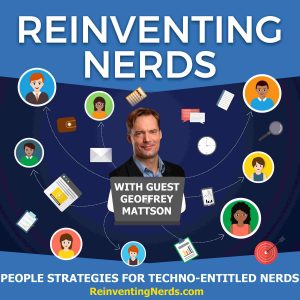![]()
Franklin Taggart is the host of the podcast called Your Own Best Company. He coaches and leads a community of people who enjoy working alone. A lot of nerds work alone and it seemed like a good idea to learn more about what kind of support is out there for them. This is also a special episode because it is the 50th episode and Franklin was my first guest on the podcast. He gave me the idea to host a podcast and supported me through figuring out how to create one and getting it started.
Highlights:
Q: What inspired you to support people who work alone?
Most of the people Franklin has worked with have tended to be people who were working alone. He noticed some patterns and some specific challenges for this population. He also brings his enthusiasm for working alone and connecting with others in the same space.
Q: Are people who work alone typically introverts or does personality matter?
Franklin says he often works with introverts who enjoy a slow pace and quiet place.
Q: Who are your typical clients? Are they remote workers in companies who work on their own or solopreneurs or something else?
Franklin started off mostly working with artists, authors, and musicians, but now works with a lot of businesspeople too. The majority of clients are in professional services, like coaching and consulting, some who are freelancers, and others have roles such as technical writers.
Q: What kinds of challenges do they run into? How do you help them?
Franklin discusses several challenges. One of the biggest challenges is that working alone means having to wear a lot of hats. A resulting challenge is being unwilling to delegate and let go of control.
In this episode, we also talk about social isolation, anxiety, and depression, why people who like to work alone would want to have a community, what the benefits are of working alone, ow can extroverts succeed at working alone, and what resources Franklin recommends for people who work alone.
Shout Out:
The book The Company of One by Paul Jarvis is a great resource.
Words of Wisdom:
Introverted doesn’t mean shy.
People who prefer working alone still need human contact.
Contact Franklin Taggart:
Website: https://www.franklintaggart.com/
LinkedIn: https://www.linkedin.com/in/franklin-taggart-coaching/
Podcast: Your Own Best Company
Podcast: Play in new window | Download
